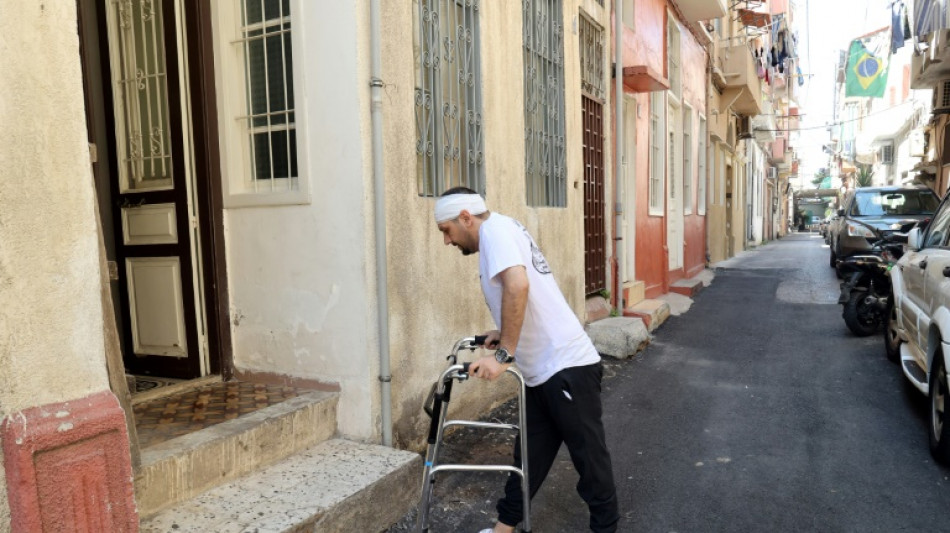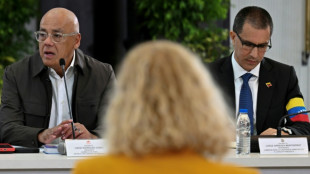
-
 NFL names 49ers to face Rams in Aussie regular-season debut
NFL names 49ers to face Rams in Aussie regular-season debut
-
Bielle-Biarrey sparkles as rampant France beat Ireland in Six Nations

-
 Flame arrives in Milan for Winter Olympics ceremony
Flame arrives in Milan for Winter Olympics ceremony
-
Olympic big air champion Su survives scare

-
 89 kidnapped Nigerian Christians released
89 kidnapped Nigerian Christians released
-
Cuba willing to talk to US, 'without pressure'

-
 Famine spreading in Sudan's Darfur, UN-backed experts warn
Famine spreading in Sudan's Darfur, UN-backed experts warn
-
2026 Winter Olympics flame arrives in Milan

-
 Congo-Brazzaville's veteran president declares re-election run
Congo-Brazzaville's veteran president declares re-election run
-
Olympic snowboard star Chloe Kim proud to represent 'diverse' USA

-
 Iran filmmaker Panahi fears Iranians' interests will be 'sacrificed' in US talks
Iran filmmaker Panahi fears Iranians' interests will be 'sacrificed' in US talks
-
Leicester at risk of relegation after six-point deduction

-
 Deadly storm sparks floods in Spain, raises calls to postpone Portugal vote
Deadly storm sparks floods in Spain, raises calls to postpone Portugal vote
-
Trump urges new nuclear treaty after Russia agreement ends

-
 'Burned in their houses': Nigerians recount horror of massacre
'Burned in their houses': Nigerians recount horror of massacre
-
Carney scraps Canada EV sales mandate, affirms auto sector's future is electric

-
 Emotional reunions, dashed hopes as Ukraine soldiers released
Emotional reunions, dashed hopes as Ukraine soldiers released
-
Bad Bunny promises to bring Puerto Rican culture to Super Bowl

-
 Venezuela amnesty bill excludes gross rights abuses under Chavez, Maduro
Venezuela amnesty bill excludes gross rights abuses under Chavez, Maduro
-
Lower pollution during Covid boosted methane: study

-
 Doping chiefs vow to look into Olympic ski jumping 'penis injection' claims
Doping chiefs vow to look into Olympic ski jumping 'penis injection' claims
-
England's Feyi-Waboso in injury scare ahead of Six Nations opener

-
 EU defends Spain after Telegram founder criticism
EU defends Spain after Telegram founder criticism
-
Novo Nordisk vows legal action to protect Wegovy pill

-
 Swiss rivalry is fun -- until Games start, says Odermatt
Swiss rivalry is fun -- until Games start, says Odermatt
-
Canadian snowboarder McMorris eyes slopestyle after crash at Olympics

-
 Deadly storm sparks floods in Spain, disrupts Portugal vote
Deadly storm sparks floods in Spain, disrupts Portugal vote
-
Ukrainian flag bearer proud to show his country is still standing

-
 Carney scraps Canada EV sales mandate
Carney scraps Canada EV sales mandate
-
Morocco says evacuated 140,000 people due to severe weather

-
 Spurs boss Frank says Romero outburst 'dealt with internally'
Spurs boss Frank says Romero outburst 'dealt with internally'
-
Giannis suitors make deals as NBA trade deadline nears

-
 Carrick stresses significance of Munich air disaster to Man Utd history
Carrick stresses significance of Munich air disaster to Man Utd history
-
Record January window for transfers despite drop in spending

-
 'Burned inside their houses': Nigerians recount horror of massacre
'Burned inside their houses': Nigerians recount horror of massacre
-
Iran, US prepare for Oman talks after deadly protest crackdown

-
 Winter Olympics opening ceremony nears as virus disrupts ice hockey
Winter Olympics opening ceremony nears as virus disrupts ice hockey
-
Mining giant Rio Tinto abandons Glencore merger bid

-
 Davos forum opens probe into CEO Brende's Epstein links
Davos forum opens probe into CEO Brende's Epstein links
-
ECB warns of stronger euro impact, holds rates

-
 Famine spreading in Sudan's Darfur, warn UN-backed experts
Famine spreading in Sudan's Darfur, warn UN-backed experts
-
Lights back on in eastern Cuba after widespread blackout

-
 Russia, US agree to resume military contacts at Ukraine talks
Russia, US agree to resume military contacts at Ukraine talks
-
Greece aims to cut queues at ancient sites with new portal

-
 No time frame to get Palmer in 'perfect' shape - Rosenior
No time frame to get Palmer in 'perfect' shape - Rosenior
-
Stocks fall as tech valuation fears stoke volatility

-
 US Olympic body backs LA28 leadership amid Wasserman scandal
US Olympic body backs LA28 leadership amid Wasserman scandal
-
Gnabry extends Bayern Munich deal until 2028

-
 England captain Stokes suffers facial injury after being hit by ball
England captain Stokes suffers facial injury after being hit by ball
-
Italy captain Lamaro amongst trio set for 50th caps against Scotland


Disabled survivors of Beirut port blast long for support, justice
Dany Salameh was already ill but a blast that devastated Beirut's port three years ago aggravated his condition, leaving him dependent on a walker and feeling abandoned by authorities.
People hurt or disabled by the catastrophic explosion told AFP that Lebanon, bankrupt and politically paralysed, has failed to deliver adequate medical care, financial support or justice.
"The state forgot about us," said the soft-spoken Salameh from his apartment in a district close to the port, much of which was destroyed along with entire districts of Beirut in one of history's biggest non-nuclear explosions.
"I lost my car, my home, my job, my mobility... Yet no one looked after us," he added.
The blast on August 4, 2020 killed more than 220 people and injured at least 6,500.
Salameh was at his family home in a neighbourhood adjacent to the port when the blast threw him from one side of their rooftop terrace to the other.
Formerly a sound engineer, he had been diagnosed in 2015 with multiple sclerosis -- a lifelong condition in which a person's central nervous system is attacked by the body's own immune system.
While Salameh escaped bad physical injury in the explosion, the shock had a devastating effect on his illness. He soon found himself struggling to walk.
Vital medicine for his disease costs $140 a month, twice-yearly injections cost $1,000, and he said he needs an operation that costs $10,000.
But Salameh is unable to afford health care as he survives on family support and limited work opportunities.
His head was bandaged after a fall last month requiring stitches, and he said he had gone for months without his regular medication.
- 'My life has ended' -
The blast came during an economic collapse that has crippled Lebanon's public sector and pushed most of the population into poverty.
Amanda Cherri, a former make-up artist, said injuries and constant pain forced her to give up her career.
"My life has ended. Someone stole it in only five minutes," said Cherri, 40, from the building overlooking the port where she used to work.
At the moment of the explosion, she was near floor-to-ceiling mirrors and two huge vases that all smashed to smithereens.
The shards pierced her face and body, leaving her blind in one eye and with one hand paralysed.
Authorities said the blast was triggered by a fire in a warehouse where a stockpile of ammonium nitrate fertiliser had been haphazardly stored for years.
"People who have become disabled have a right to lifelong support," said Sylvana Lakkis, who heads the Lebanese Union for People with Physical Disabilities.
Yet "to this day, many need treatment they cannot afford," she added.
Authorities have failed to keep track of the number of people left disabled by the blast, Lakkis said, but her organisation estimates that up to 1,000 people sustained temporary or permanent impairments.
At least four people who were disabled have died in the past year because they could not afford treatment, or received improper medical care, Lakkis told AFP.
"The explosion did not kill them. Their country did," she said.
- 'No hope' -
Mikhail Younan, 52, needs a prosthetic knee but he cannot even afford a doctor's appointment.
He delivers gas tanks to people's homes, in a country where there is no mains gas for cooking or heating and state power cuts last most of the day.
His knee was injured in the blast and his other leg now gives him trouble too. He struggles to carry the heavy gas tanks up and down flights of stairs.
Younan said he has lost customers and earns just a fraction of what he used to.
"If the Lebanese state had helped me... I would have been able to live a somewhat normal life," said Younan, who has a teenage daughter.
Instead, "pain has become my daily companion," and he said he has "been living on painkillers and anti-inflammatories that have given me kidney problems."
Lack of accountability has long been a hallmark of the Lebanese justice system, which is highly politicised in a country built on sectarian power-sharing.
Political and legal challenges have beleaguered the local probe into the blast, with high-level officials filing lawsuits against the investigating judge who charged them.
No one has yet been held responsible and the investigation is at a standstill.
Younan said he wants his daughter to leave Lebanon as soon as she finishes school.
"I have no hope," he said.
"Every time the wheel of justice turns, someone tries to break it."
Z.AlNajjar--SF-PST



